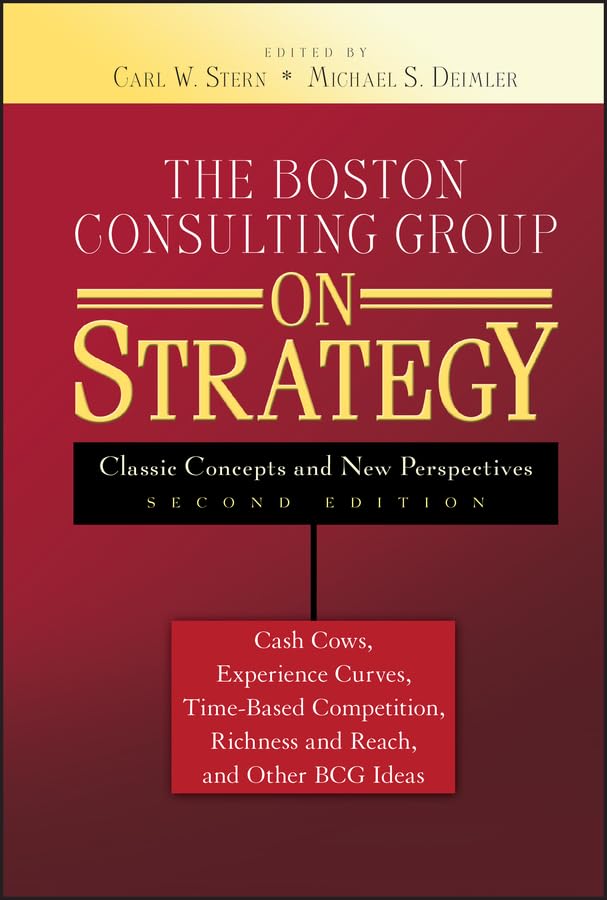The Boston Consulting Group on Strategy: A Deep Dive into Business Strategy Evolution
This compendium offers a profound exploration of strategic thinking, combining classic theories with contemporary insights to guide leaders through the complexities of modern business landscapes.
Subjects: Strategy
“The Boston Consulting Group on Strategy: Classic Concepts and New Perspectives,” edited by Carl W. Stern and Michael S. Deimler, serves as a seminal collection of insights and analyses that have shaped the domain of business strategy over the past decades. This review aims to dissect the key components, compare its contents with similar works, and evaluate its significance in the broader context of strategic management literature.
At its core, the book is structured around five pivotal themes:
- The Nature of Business Strategy
- The Development of Business Strategy
- The Practice of Business Strategy
- Business Thinking
- Social Commentary
Each section builds upon the preceding one, creating a comprehensive narrative that not only chronicles the evolution of strategic thought but also provides practical guidance on its application.
Key Concepts and Contributions
- Strategic and Natural Competition: Introduced by Bruce D. Henderson, this concept underscores the intrinsic competitive dynamics within industries and the importance of strategic positioning.
- The Experience Curve and Portfolio Management: These concepts, foundational to BCG’s strategic framework, emphasize the significance of cost leadership and balanced business portfolios for sustainable competitive advantage.
- Time-Based Competition and Capabilities: Highlighting the works of George Stalk Jr. and others, this section delves into the critical role of speed and core competencies in achieving market dominance.
- Innovation and Growth: Through various essays, the book advocates for a culture of continuous innovation and strategic growth initiatives as key drivers of long-term success.
- Social and Economic Impact of Strategy: The book does not shy away from addressing the broader implications of strategic decisions, touching on issues like regulation, public policy, and the social responsibilities of corporations.
Comparative Analysis
When compared to other seminal works in the field, such as Michael Porter’s “Competitive Strategy” or Henry Mintzberg’s “Strategy Safari,” Stern and Deimler’s compilation stands out for its diversity of perspectives and practical insights derived from real-world applications. While Porter focuses on competitive forces and Mintzberg on the process and forms of strategy, “The Boston Consulting Group on Strategy” provides a multifaceted view that encapsulates the essence of strategic thinking from various angles.
Practical Implications and Leadership Insights
One of the book’s strengths lies in its ability to translate complex strategic concepts into actionable insights for business leaders and practitioners. Through case studies and historical analyses, it offers valuable lessons on navigating competitive landscapes, fostering innovation, and driving organizational change.
Critique and Limitations
While the book offers an extensive overview of strategic concepts, its breadth can also be seen as a limitation. The wide range of topics, though enriching, might overwhelm readers seeking deep dives into specific strategic issues. Furthermore, given the rapid pace of change in the business world, some essays might seem dated, necessitating a critical evaluation of their applicability to contemporary challenges.
Conclusion and Recommendations
“The Boston Consulting Group on Strategy” is an essential read for anyone interested in the art and science of strategic management. Its comprehensive coverage of topics makes it a valuable resource for both seasoned executives and aspiring leaders. For those looking to further expand their understanding of strategy, complementary readings could include Clayton Christensen’s “The Innovator’s Dilemma” for insights on disruptive innovation, and Jim Collins’ “Good to Great” for a focus on the principles driving company transformation and excellence.
In conclusion, Stern and Deimler’s collection not only commemorates the historical milestones of strategic thinking but also challenges readers to anticipate and shape the future dynamics of global business. It stands as a testament to the enduring relevance of strategic insight in navigating the complexities of the modern economic landscape.




